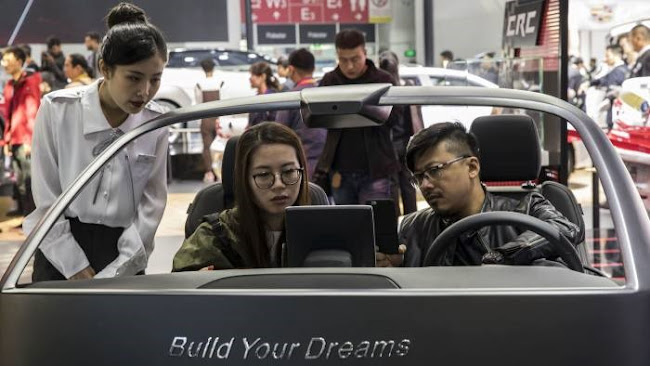Tesla-rival BYD smashes profit record ahead of European push
Warren Buffett-backed Chinese carmaker reports 350% year-on-year earnings growth
Gloria Li in Hong Kong and Edward White in Seoul
 BYD’s third-quarter net profit of Rmb5.7bn ($786mn) beat its previous record of Rmb2.8bn set in the second quarter © Qilai Shen/Bloomberg
BYD’s third-quarter net profit of Rmb5.7bn ($786mn) beat its previous record of Rmb2.8bn set in the second quarter © Qilai Shen/BloombergTesla’s main Chinese challenger BYD has shrugged off supply disruptions as well as foreign and domestic rivals to achieve year-on-year earnings growth of 350 per cent, underscoring the rapid rise of one of China’s most formidable industrial conglomerates.
The Warren Buffett-backed group’s third-quarter net profit of Rmb5.7bn ($786mn) smashed its previous record of Rmb2.8bn set in the second quarter of this year.
The results come just as BYD mounts an aggressive campaign to take on European automakers on their home turf.
Revenue for the three-month period at the world’s largest electric vehicle maker reached Rmb1,17.1bn, up 116 per cent year on year, a Hong Kong stock exchange filing showed on Friday.
Sales of BYD’s “new energy” passenger vehicles, which include plug-in hybrids, pure battery and hydrogen-powered models, also hit a record high of 538,704 units in the July to September quarter, up 194 per cent from a year earlier.
The Chinese homegrown brand announced last month that it would start selling three new models in Europe by the end of the year.
BYD started life in the mid-1990s, with founder Wang Chuanfu scoring success making batteries for early mobile phones.
The former professor ventured into cars two decades ago after purchasing a failing state-owned auto group and missile producer.
His EV ambitions enticed Buffett’s Berkshire Hathaway to become a major investor.
BYD is now among a clutch of Chinese companies posing an existential challenge to electric vehicle industry leader Tesla and incumbent auto titans as the world transitions to EVs.
The Shenzhen-based company is highly self-sufficient, controlling its local supply chain of minerals and batteries as well as computer chips and other electronics.
Rival Tesla is among its battery customers.
While many of China’s businesses face uncertainty stemming from Xi Jinping’s reassertion of Communist party control, BYD is viewed as in line with national security priorities on energy and technology independence.
Chinese new energy car sales rose 94 per cent year on year to 708,000 units in September, according to the China Association of Automobile Manufacturers.
BYD dominated the market with a 30 per cent share in the year to September, 21 percentage points ahead of the next competitor, SAIC-GM-Wuling.
Neil Beveridge, an analyst with Bernstein in Hong Kong, said China accounted for about seven in every 10 EVs sold globally.
Beijing has set a target of EVs accounting for 25 per cent of new vehicles sold by 2025, but the country is tracking towards hitting 35 per cent next year and half of sales in three years.
Beveridge said the growth was driven not only by affordable vehicles and deep government support, but also by China’s early rollout of charging infrastructure and cheap electricity.
“While China is powering ahead, the question is whether the rest of the world can catch up,” he added.
0 comments:
Publicar un comentario